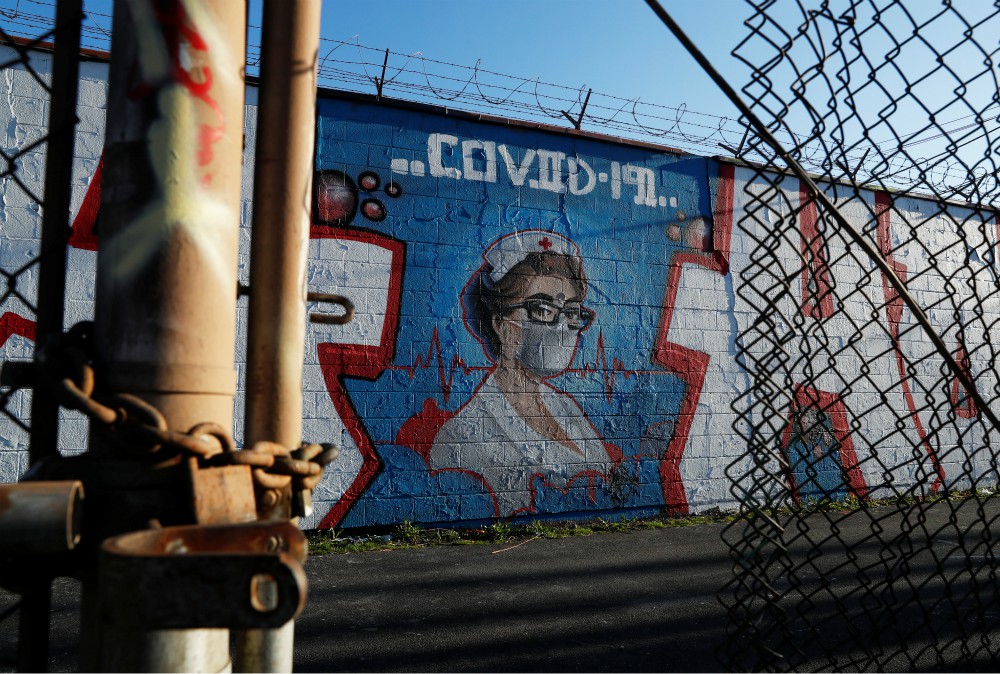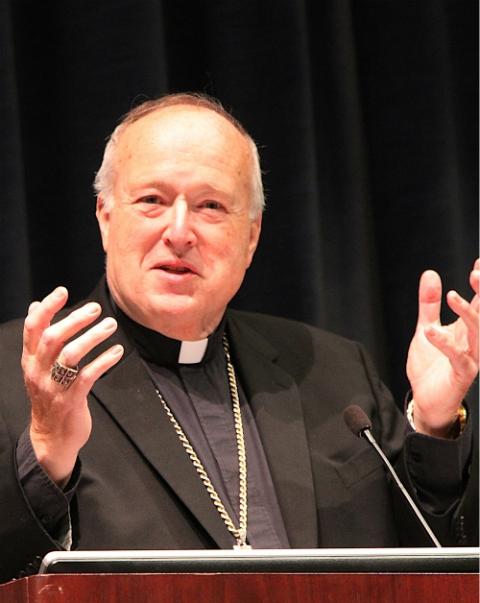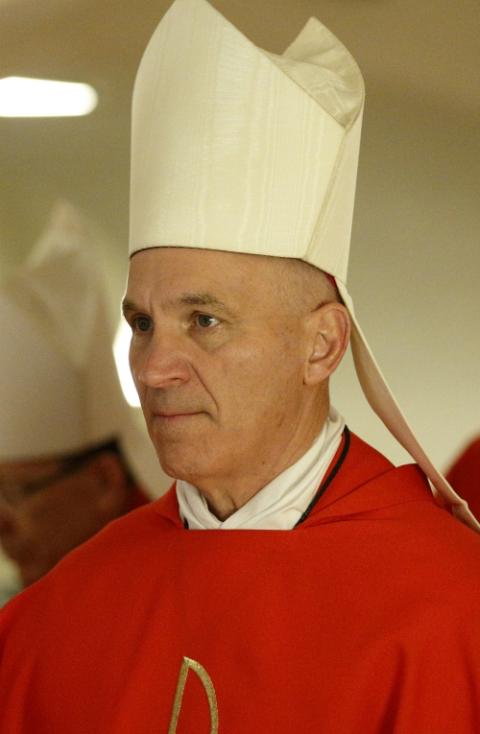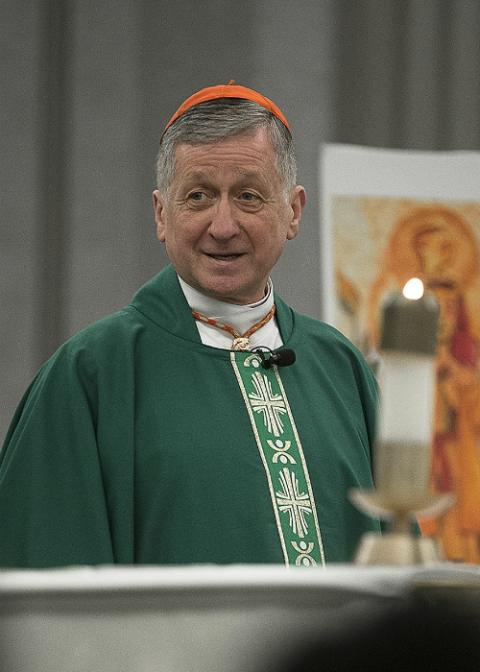
A mural of a health care worker is seen in Chicago April 21 during the coronavirus pandemic. "My conversations with local officials is simply this: Tell us what you need, and we'll see what we can do," says Chicago Cardinal Blase Cupich. (CNS/Reuters/Shannon Stapleton)
Beyond the myriad health and economic anxieties caused by the ongoing coronavirus pandemic, Catholics across the United States are also struggling with being unable to physically attend Mass or otherwise gather in person together for worship or prayer.
In separate NCR interviews focused on their message for Catholics in this unprecedented time, three of the country's bishops urged lay faithful to do what they can, despite the unique difficulties of the moment, to develop their prayer lives and to reach out to those most in need.
Chicago Cardinal Blase Cupich, San Diego Bishop Robert McElroy and Cheyenne, Wyoming, Bishop Steven Biegler, each speaking by phone April 22, mentioned a number of ways Catholics could use this time for spiritual development.
Cupich suggested that the experience of being apart from one another could enrich how Catholics celebrate the liturgy in the future.
"I'm convinced that we're going to find and rediscover some core values of what it means to be church in this moment that will make us a better church after this, when we in fact are coming together," said the cardinal.
"We will have [had] the experience of sharing each other's bread, of sacrificing for each other — the experience that we believe takes place in the Eucharist of Christ sacrificing himself, because we will have sacrificed," he said.

Bishop Robert McElroy at the University of San Diego in February (CNS/Courtesy of University of San Diego/Ryan Blystone)
McElroy stressed that this should not be a moment of "pause," but rather "a moment in which we look at how in this new environment, however long or short it's going to be, we respond pastorally and try to touch people with God's grace and the presence of the church ... insofar as we can."
And Biegler said he has been advising Catholics in Wyoming to use the time to deepen their reading of the Scriptures, telling them: "Don't just wait it out. Don't just try and get beyond it. Don't miss the moment."
"One of the things I tell people is that we're temporarily deprived of the Eucharist, but we can never be deprived of our baptism," he said. "It's time to live our baptism well. The power of the Spirit is working in our hearts. It's been poured into our hearts. We can pray through the grace of our baptism."
Cupich, McElroy and Biegler spoke as nearly all dioceses across the country have stopped the public celebration of the Mass in order to stem the spread of the coronavirus, and most of the nation's some 73 million Catholics have been unable to physically take part in a eucharistic celebration for more than a month.
The three bishops each addressed the matter in personal terms, acknowledging how difficult it is for many people, even if some have been able to worship together via livestreamed services.
Biegler, who has led Wyoming's only diocese since 2017, compared the sense of being deprived of the Eucharist to the feeling a person has when they lose a friend or loved one.
"Our sense of loss reveals the depth of our love," he said. "And when I'm working with a family who is in mourning, I always remind them that the deeper the love, the greater the loss."

Bishop Steven Biegler at the Vatican in February (CNS/Paul Haring)
The bishop said that the lost access to the Eucharist is also compounded by the loss of the ability to worship together in the same space, or even just to physically see particular clergy or friends.
"First of all, we have to help people get in touch with what have they lost, or what is this loss that they are feeling?" said Biegler. "But because the loss is there — the greater the loss, the deeper the love."
Cupich, who has been Chicago's archbishop since 2014, suggested that Catholics could ask themselves: "What's the Lord doing now in our life in all this?"
Referencing the Gospel account of Jesus' appearance after his resurrection to two disciples who were walking to Emmaus, the cardinal said: "The Lord has not abandoned us. He's walking with us along the way, as he did with those disciples in Emmaus."
"What Scriptures, what word of God, what revelations of our tradition is he uncovering in a different way for us, so that when we meet for the breaking of the bread, we'll see that all along he was there to nourish us, and he left our hearts burning?" Cupich asked.
McElroy, San Diego's bishop since 2015, acknowledged that his experience of the crisis is different from that of laypeople.
"There's certain elements of this hardship that all of us are together on," he said. "But on the Eucharist question, the bishop or the priest doesn't have the same experience as the people. Because we say Mass. We get the Eucharist."
"Yes, pastorally we understand it," said the bishop. "But we don't experience it in the same lack emotionally that is quite apparent in people's lives."
Ministering to the sick, helping local authorities
Each of the bishops also spoke about how his own life has changed due to social distancing measures. They mentioned an increase in video calls to coordinate with chancery staff working remotely, and with pastors and lay leaders as they try to continue going about their ministry in different ways.
Cupich particularly highlighted the work of a team of 24 priests that his archdiocese has organized to visit hospital patients sick with COVID-19, and to offer anointing of the sick as necessary.
The priests have each received specific training and use personal protective equipment to prevent transmission of the virus.
The cardinal said he had spoken to one of the 24 priests recently. The cleric had ministered to a man who died on Easter Sunday.
Advertisement
"That simple encounter of being with someone at that moment, realizing that you're representing that person's family and loved ones, left him with a real sense of why he became a priest," said Cupich.
"It is the priest as mediator, as one who is able to bridge gaps that are otherwise imposed on us because of situations like this," he said.
One worry each of the bishops mentioned was for parishes where donations are substantially down due to the stoppage of Masses, parishes that may now have difficulty paying staff or continuing to function.
"It's a big hit," said Biegler, citing a figure that donations to parishes could be down 40-60% nationally.
"We're helping parishes look at what they would have budgeted for revenue and expenses, and what's actual now for these months, and doing it month by month, so they can get a handle on it," he said.
Cupich said he had created an emergency fund for Chicago parishes that are in particular difficulty.
While the cardinal said the archdiocese's parish reorganization program, known as "Renew My Church," would go forward, he said the way communities are being affected by the financial aspect of the pandemic would not determine future decisions on parish closures or mergers.

Cardinal Blase Cupich at the Catholic Social Ministry Gathering in Washington in January (CNS/Tyler Orsburn)
"We are going to continue with our Renew My Church program, but what we're going to do with anything in regard to the merging or closing of parishes is follow our discipline," he said. "Our main thing is: What's the long-term sustainability of a place, and the need of a place in a certain area."
"This moment ... cannot be the determining factor," he said.
Each of the bishops also spoke about working with local authorities to help contain the spread of the virus, and to provide for those most in need during these times.
Cupich said that in his conversations with Chicago Mayor Lori Lightfoot and Illinois Gov. J.B. Pritzker, he has stressed that the archdiocese is available to assist them in any way possible.
"My only request to them is to let us know how we can help them promote the common good," said the cardinal, mentioning that the archdiocese has been sponsoring "pop-up pantries" in northeastern Illinois' Cook and Lake counties to help newly unemployed families in need of assistance with groceries.
Cupich also mentioned that the archdiocese is seeking to help nonviolent offenders who are being released from prisons in an effort to stem the transmission of COVID-19. He said its Kolbe House Jail Ministry is helping the newly released find places to live and get ahold of essential items.
"My conversations with local officials is simply this: Tell us what you need, and we'll see what we can do," said the cardinal.
McElroy pointed to the work of San Diego Catholic Charities, which has started a program to provide food delivery to people unable to leave their homes because they are especially vulnerable to the virus.
"It's expanded greatly," he said of the program. "We're now the largest supplier of food to people in San Diego County, which is about 3 million people."
McElroy acknowledged that as a bishop he is being spared from having to endure some of the hardships that many Catholics in his diocese may be dealing with.
"There's a lot of people suffering in this," said the prelate. "And there's a lot of people putting themselves at risk" to help others or keep their jobs.
But McElroy said there are also "some very powerful ways that God's grace is coming through."
"It again reminds us that God is not constricted to particular ways of bringing grace and being present," said the bishop.
[Joshua J. McElwee (jmcelwee@ncronline.org) is NCR Vatican correspondent. Follow him on Twitter: @joshjmac.]








